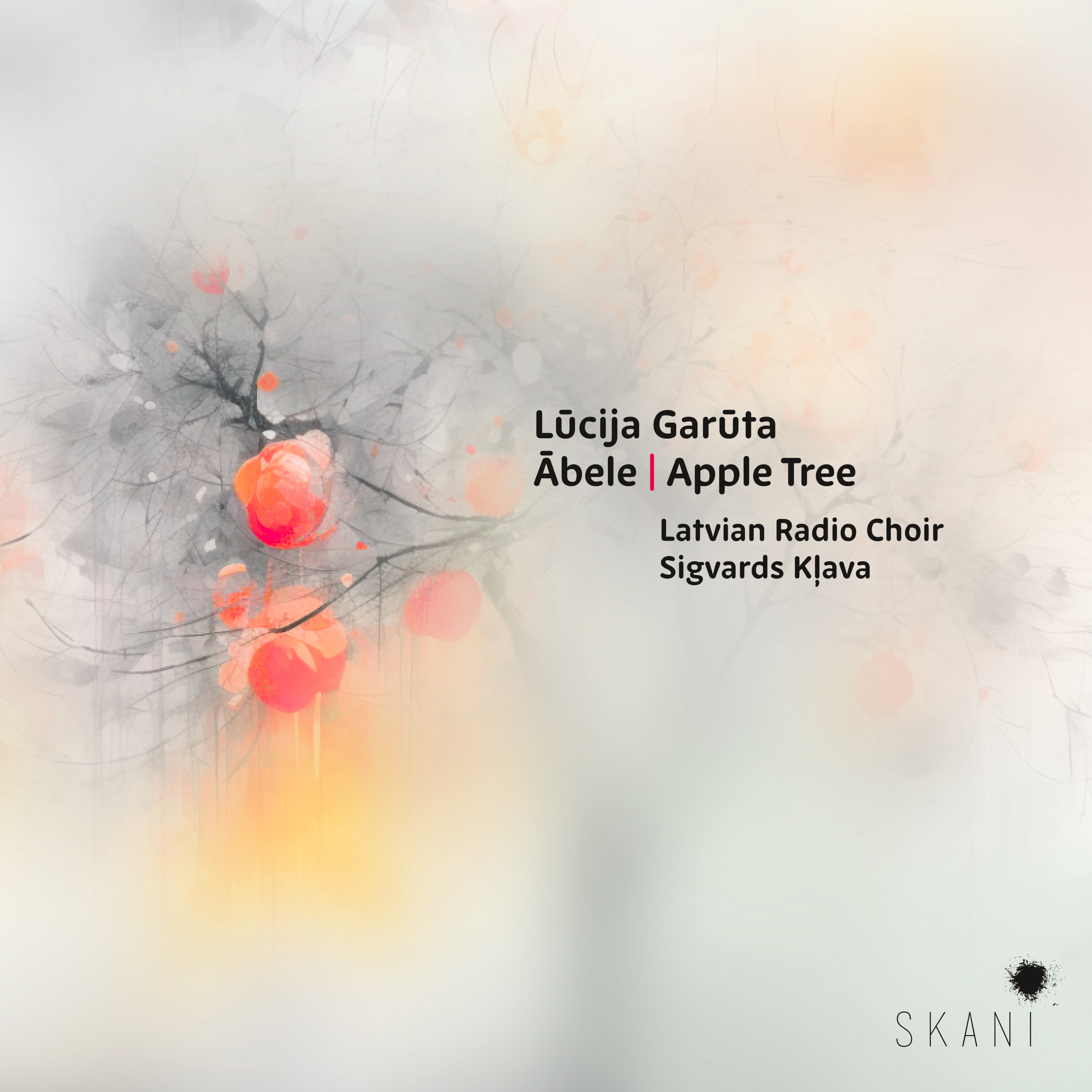Thanks to the boom in female composers being rescued from oblivion lately, I was sent a CD by Latvian Lūcija Garūta (1902-1977). The album is entirely dedicated to her choral music and named after the opening song Apple Tree, which she composed in 1956. A number of pieces have their premieres on this album.
Lūcija Garūta was a celebrated song composer in Latvia in the early 20th century. During recitals, the halls were full, where she was praised not only for her beautiful songs but also for her delicate piano accompaniment. She studied in Riga with Jāzeps Vītols, among others, and in Paris with Alfred Cortot and Paul Dukas. She was attracted to the aesthetics of the Groupe des Six, but also incorporated elements of Latvian folk music.
In the CD booklet we read that her work – as was the case with many composers from the former Soviet Bloc – can be divided into roughly two periods, before and after WWII. In Latvia great social and cultural freedom prevailed until 1940, when Russia annexed the three Baltic states and a period of repression and Russification began. Anything that even hinted at modernity was banned.
The apparatchiks demanded large-scale choral works in major keys that celebrated the Soviet state. Up to then, Garūta had written little for large choirs and she seemingly accommodated to the new cultural climate. Yet she managed to subtly maintain her own voice within the frameworks imposed by the Soviets.
The Latvian Radio Choir collected material from both public and private collections, but unfortunately compositions from the early period are missing, so we cannot form a picture of her development. Influences of the Groupe des Six are not really discernible in the 21 recorded choral songs, but her music is appealing and heartfelt, and displays a great love for her homeland.
Apple Tree, for instance, is a disguised ode to the fortitude of the Latvian people. This is symbolised by an apple tree on the banks of the Daugava, the longest river in the Baltic States. The water ‘sighs in restlessness, but the apple tree – your people – will never die’. The harmonies of the beautifully alternating male and female choir switch between sweet-voiced euphony and wistful lamentation, with a slightly dissonant touch.
This is even more true for May we Latvians forever be free to a poem of herself, which Garūta probably composed in 1940. With its sing-along melodies, this breathes the atmosphere of folk music, while uncouth, Russian-sounding basses seem to allude to the ruthless knot of the occupying forces.
With its sudden changes between major and minor, extreme dynamics and highly dissonant exclamations, The Voice of Peace is one great indictment of war: ‘man was not born to be mowed down in senseless death’. – Not surprisingly, Garūta’s work faded into the background at the time of Soviet domination.
The performance by the Latvian Radio Choir is outstanding and soulful. Conductor Sigvards Kļava and his singers deserve credit for bringing these compelling songs out from under the dust.
Thea Derks
www.theaderks.wordpress.com, 05/2024
_________________________
Lūcija Garūta worked during the central third of the 20th century, and after World War II in a land forcibly colonised by the Soviets. Her musical style had to undergo an equally forced change to accommodate the dictates of Socialist Realism in music. From what I can discover, things in Latvia were not as dreadful as in Russia, where composers such as Prokofiev and Shostakovitch had to bend the knee to political correctness of a chilling and killing kind. Lūcija Garūta did bend the knee, however. In embracing Latvian folk music, her post-war music became simpler and more diatonic.
I have made the mistake of listening to the programme all at once. There are tweny-one tracks, the longest by far at just under 7 minutes, the shortest at 1¾ minutes. Their relative similarity prevents the appreciation of their individual qualities. It would have been far better to choose individual songs and concentrate on them.
The works are not far off mid-19th-century melodic style; many could be Elgar’s choral songs. There is an occasional slight harmonic side-step and maybe some contrapuntal parts, but nothing that would raise an eyebrow. The Soviet Cultural Commissar in Latvia would have approved. All songs attractive if not striking. To my ears, the best is Dziesminas gaitas on track 11, in which Därta Paldiņa’s lovely contralto soars above the choir.
The choir, as usual these days, is absolutely outstanding. Technically accomplished and beauteous of tone, they are a pleasure to hear. The disc is a high-quality production, with copious biographical notes and full song texts in Latvian and English. The recording is natural and spacious; I cannot imagine it being improved upon.
Jim Westhead,
musicwebinternational.com, 01/2024
________________
Those who enjoy exploring the uncharted byways of choral music will definitely relish this new disc of a cappella works by Lūcija Garūta (1902 77), a pioneering Latvian female composer, new to me. If any further recommendation were needed, the performers are the stunning Latvian Radio Choir, directed by Sigvards Kl,ava.
Garūta was one of the first professional female composers in Latvia. Following an extended period at the Riga Conservatory (when she also served as repetiteur for the National Opera), in 1926 she visited Paris, where she studied briefly with Alfred Cortot and Isidor Philipp. In 1928 she returned for lessons with Paul Dukas. Inspired by the fresh approaches of Les Six, she quickly established herself as an active pianist, chamber musician and a prolific composer, particularly of songs. There are also a Piano Concerto and an unfinished opera, The Bird in Silver. Somehow, she survived the terrors of both of the Soviet occupations and the Nazi invasion. Her courageous landmark 1943 cantata Dievs, Tava zeme deg! (‘God, your land is burning!’) is regarded as being one of the most significant native Latvian pieces.
In the severe grip of the Soviet regime, Garūta switched to choral compositions, 21 examples of which are included here. The hallmarks of her thoroughly tonal idiom are a strong melodic gift coupled to a melancholic lyrical depth, contrasting with ecstatic outbursts, for example at the conclusion of the rolling Day of Song. Bass lines are solid, textures are refreshingly varied, modulations cunningly thrown, as attractive to the listener as for those singing. Sometimes a strophic approach provides sufficient structural framework; at other times Garūta adopts a through-composed method.
Modalism is never far from the surface, heavily influenced by the prevalent folk-song tradition. The quiet intensity of May We, Latvians, Forever Be Free is all the more effective given its emotional restraint. Nature inspires the disc’s title-track, Apple Tree, which dates from 1956, and the equally beautiful In the Spring Rain (1960) and Autumn Song of the Migrating Birds. Particular highlights include the penultimate track, A White Sheep Swims in the Sea, gloriously rich and quasi-orchestral, and the harmonically adventurous The Voice of Peace.
This is a groundbreaking album, sung with perfervid expertise, and a testament to the resilience of the human spirit in the face of crushing adversity.
Malcolm Riley
Gramophone Magazine, 11/2023
____________________________________________
Lucija Garuta was an influential composer in Latvia. She held a professorship at the Academy of Music in Riga until her death in 1977. Vocal music – songs and choral works – characterize her compositional work. The present album is the result of a first published ‘Apple Tree’ – the title reveals the thematic thread: Nature is at the center of the compositions often as a parable about man and his emotions. Again and again, folk-song-like sounds are mixed into the music, songs that have contributed significantly to the self-assurance of Latvia and its people.
This complexity of Garuta’s choral music is excellently translated into sounding emotions by the Latvian Radio Choir under Sigvards Klava. At times we witness a magnificent, promising sunrise, the path to a hopeful future (Come, Young Generation), at other times the choir strikes hymnal, reflective and confident notes (May We, Latvians, Forever Be Free, A Wish for a Child), then it becomes wonderfully pastoral (The Little Song’s Path).
These are just a few examples that emphatically underline the creative power, the versatility of the Latvian Radio Choir, without ever upsetting the finely balanced choral sound.
★★★★
Guy Engels
PIZZICATO, 08/11/2023

